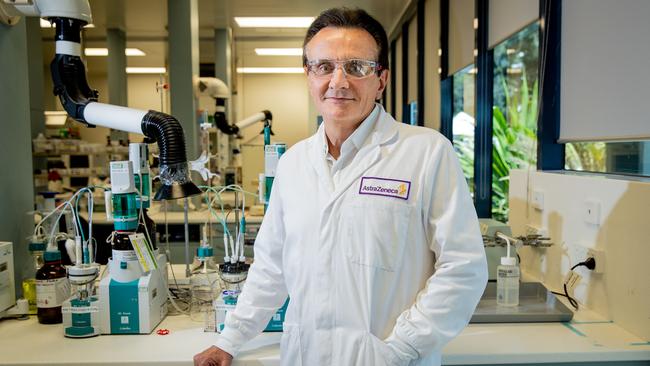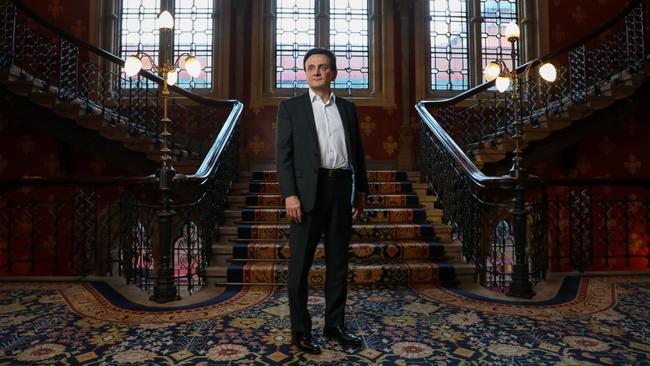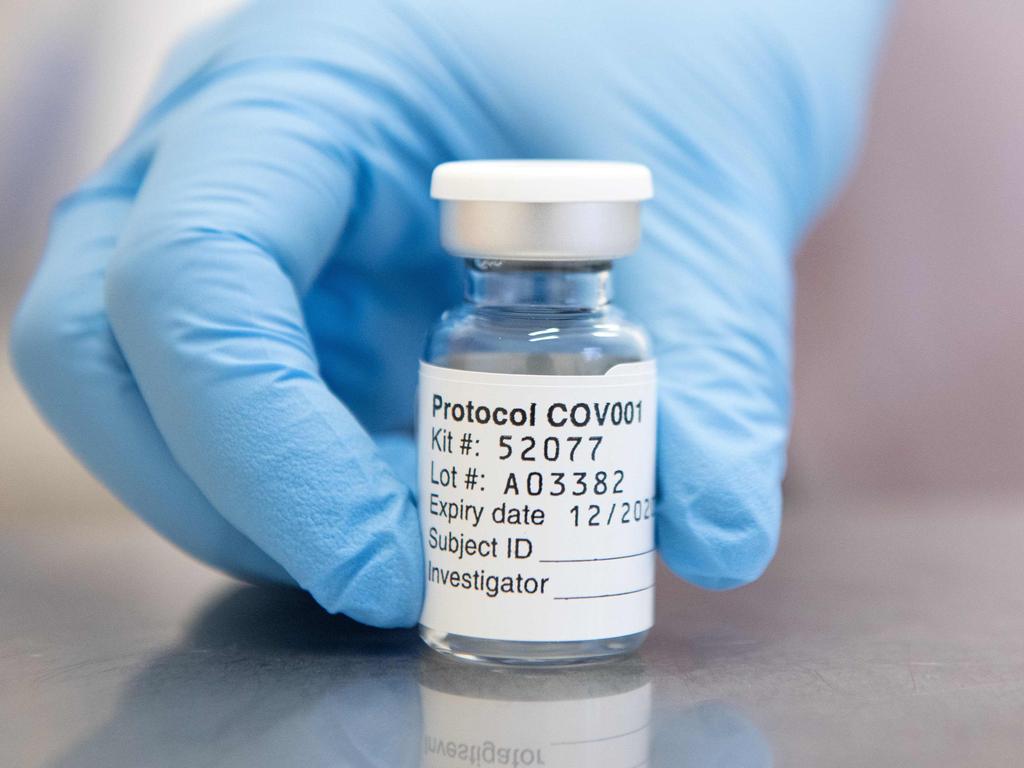AstraZeneca boss Pascal Soriot branches out with mass tree planting
Speculation that AstraZeneca would never repeat its mission to roll out vaccines to the world without profit has been smashed by the CEO himself.

Speculation that AstraZeneca would never repeat its mission to roll out vaccines to the world without profit has been smashed by the CEO himself.
And that should not surprise anyone who has been following Pascal Soriot and his commitment to ESG.
As the world deals with two crises, the clear and present danger of Covid-19 and climate change, Soriot is not just building human resilience. AstraZeneca is also planting 50 million trees globally, 25 million of which will be in Australia in a team-up with environment enterprise Greening Australia. It is the largest privately funded restoration project in the country but not widely known. To put this into perspective, Woodside is planting 3.6 million trees.
To date, AstraZeneca has supplied 450 million vaccine doses to 165 countries.
“In India, 90 per cent of the vaccinations are done with our vaccine. Ninety-eight per cent of the supply to Covax, the instrument to supply the lower middle income countries, come from us,” Soriot said at a Greening Australia event.
Behind this achievement however, has been a relentless and sometimes brutal 18 months for the AstraZeneca chief. After building a vaccine for the global market by late 2020, the British/Swedish multinational found itself a political football in Europe, and then hit by vaccine hesitancy.
Last month on the BBC’s Today program, the broadcaster’s medical editor Fergus Walsh said that more than one senior person at AstraZeneca had privately wondered, “would we do this again?” — noting rival Pfizer would make billions out of its vaccine.
Asked if he would do it all again, Soriot says: “Oh absolutely. I think in life you have to keep the ultimate goal in mind. Any project that is an ambitious one will have ups and downs.
“We are right now releasing 200 million doses of vaccines every month.
“We have delivered 450 million, so this is tens of thousands of lives that we have saved and it absolutely was worth it.
“If you then move to climate change, again it’s a question of people stepping up. And in the course of this journey, errors will be made. In this world you have more people who comment than you have people who do things, quite frankly. We just have to stay focused on the goal and the goal here is reduce carbon emissions and then take carbon out of the atmosphere, restore ecosystems, and it is creating economic value and jobs in the process.”
Soriot, a French-Australian dual citizen whose home is in Sydney, says that before Covid-19 struck, the bushfires made him much more aware of the carbon emissions problem.
“I started tracking the carbon in the atmosphere through an app at the time and it was quite amazing when Covid-19 happened.
“You could see the impact: carbon reduced, the pollution level reduced over the big cities.
“Our chairman is Swedish and in Sweden sustainability is really critical.”

AstraZeneca will spend $US1 billion ($1.3 billion) and is committing to a zero carbon footprint by 2025 for its own operation and to be carbon negative for the whole supply chain by 2030. This means transitioning to 100 per cent electric vehicles and 100 per cent renewable energy for heat and electricity.
“Since 2015 we have reduced our scope one and two emissions in absolute terms by 60 per cent. And we have reduced our water footprint by 20 per cent even though our business grew dramatically in volume terms, probably 30 per cent or 40 per cent.
“It shows that you can grow and generate economic value and reduce your environmental footprint.
“It requires a shift of mindset and behaviours. The bushfires was a turning point and Covid-19 is another. It reminds us that nature is much stronger than we are and if we abuse it too much, we will pay a price. Carbon reduction is key, not only for our own emissions but also for taking carbon out of the atmosphere.”
For Greening Australia’s Brendan Foran, the corporate scale that AstraZeneca delivers is transformational for the sector. “It has historically operated in the space of market failure,” he says. “We are a series of highly successful pilots, proof of concepts and early stage commercialisation activity.
“We don’t have access to balance sheets, or resources, nor sufficient access to R&D innovation and application of the technologies to mass production.
“What we need now is a highly efficient and competitive marketplace to really drive those economies of scale.
“As Pascal says, 450 million doses in 165 countries – that is true scale.
“For an organisation that wants to plant half a billion trees by 2030, it simply won’t occur without corporate partnerships.”
The first of 25 million trees are already in the ground, with about 20,000 hectares to be planted, creating 890 jobs over five years.
Soriot sees important lessons for climate change from Covid-19.
“The focus for everybody has been Covid-19, but I really think that it has spread across to the climate change crisis.
“Covid-19 will alert people on the need to prevent crises. It could have been managed much better if the whole world had been in prevention mode.
“Covid-19 taught us the power of collaboration: in that case academia, governments, companies, hospitals, doctors, everybody coming together was the only way that we could defeat this virus.
“It is the same with climate change,” Soriot says.
After the bushfires, Pascal Soriot was looking for a partner to take carbon out of the atmosphere to compensate for any emissions the business could not remove. “That brought us to this collaboration with Brendan and his team. When we thought about where to plant trees, Australia came up at the top of the list. And Greening Australia have a similar focus on science and corporate values.”
Internationally, Soriot will now be chairing the healthcare effort of Prince Charles’ new Terra Carta sustainability program, with support now from multinationals like Shell and Australia’s Macquarie Bank. He says both his shareholders and staff are on board for the climate action.
“It motivates our employees. Millennials are very focused on what companies do from a corporate responsibility viewpoint, particularly environmental. And our shareholders are becoming more and more focused on corporate responsibilities, especially the carbon footprint. The return is not a one or two-year return but over time it will be economically valuable, no question in my mind.”
The man so caught up in the politics of the vaccine wars believes governments can also do the right or the wrong thing on climate. “One of the tools is carbon pricing. It is very powerful,” he says. “As soon as you put a price to carbon, behaviours change and you create positive momentum around change.
“Governments respond to voters and of course Covid-19 was a massive crisis. They had to act quickly, but over time governments will respond to people becoming more and more aware of their environment and the need to act. Australia unfortunately is a little bit behind but we will get to a point where things will accelerate like they are everywhere in the world. And there is a lot that Australia can do for the world in removing carbon from the atmosphere.”
At AstraZeneca Soriot fought off a $130bn takeover bid from Pfizer in 2014 and turned the company around. Through Covid-19, he took the business into vaccine making from scratch and at the same time managed two huge acquisitions: $US39 billion for Alexion in the US and a $US6.9 billion deal with drugmaker Daiichi Sankyo in Japan.
He has not yet decided what to do with the vaccine business once the pandemic is over. There are many other avenues of growth. Frankly, who could blame him if he closed the chapter, having been such a vital part of the fight against the pandemic.





To join the conversation, please log in. Don't have an account? Register
Join the conversation, you are commenting as Logout